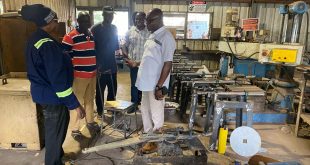
Pharmacist Kwame Sarpong Asiedu, a Fellow at the Centre for Democratic Development (CDD), has weighed in on the recent dismissal of Dr. Adam Atiku, the Chief Executive Officer of the Tamale Teaching Hospital (TTH), cautioning that the move is “neither a means to an end nor an end in itself.”
His comments come in the wake of President John Dramani Mahama’s decision to remove the TTH CEO following public uproar over alleged negligence that reportedly led to the death of a patient at the hospital’s Accident and Emergency Ward. The hospital has also been under scrutiny for deteriorating infrastructure and non-functional essential medical equipment.
Speaking Joy News’ PM Express, Dr. Kwame Sarpong Asiedu, disclosed that while leadership must be held accountable for systemic failures, such accountability must be viewed through a wider lens.
According to him, if the challenges that led to the hospital’s failings were entirely within the CEO’s control, then the dismissal is justified. However, if there were broader systemic or structural issues beyond the CEO’s reach, then the decision warrants deeper examination.
He emphasized the importance of proactive leadership, asking whether the former CEO had documented evidence of engaging higher authorities to resolve the hospital’s challenges.
“I’ve had to speak to a lot of the parties in this whole matter and I come to this conversation from the fact of a health leader and who thinks failure does not get reward. So as far as I’m concerned, removing the person with the ultimate responsibility if failure is perceived to have happened is the right decision by the ultimate decision maker, but then you have to go back to what Richard has been saying in the studio, which is what have occasion to the failure.
“Is the failure ultimately the CEO’s responsibility? If that’s yes, then the sacking is absolutely unquestionably wrong. If there are other mitigating circumstances to the firing that are beyond the scope and the reach of the CEO, then you can question the judgment of the ultimate decision maker, which in this case is the Health Minister.” He said
He continued, “But even then, you ask yourself, if these are the mitigating circumstances, what have the person who is in charge of the facility done about it? as in, if you know these things pre-exist and they predate you, is there evidence that you have, for example, had conversations with the predecessor of this Health Minister, can you show that in those conversations, you have called for the repair of these equipment or whatever mitigating circumstances they are to be addressed and what responses have you got? And ultimately, if you felt the responses you’ve got are not good enough, have you taken the professionally most credible decision of walking away because you realize that your position has been made untenable by the inability of those who have put you in trust of that facility to honor their part of the bargain as it’s giving you the right tools to work.:
He further revealed that while removing a failing leader is sometimes necessary, true reform requires more than a change in personnel. It demands systemic introspection and action from all stakeholders involved in healthcare governance
“If you’ve not done that, then ultimately you become part of the problem, so for me, I come to this conversation and like I said, I’ve had a lot of discussions around this and I come to this conversation saying that the sacking is neither a means to an end nor an end in itself.” He stated
Source: Elvisanokyenews.net
 ElvisAnokyenews Latest News Portal
ElvisAnokyenews Latest News Portal



